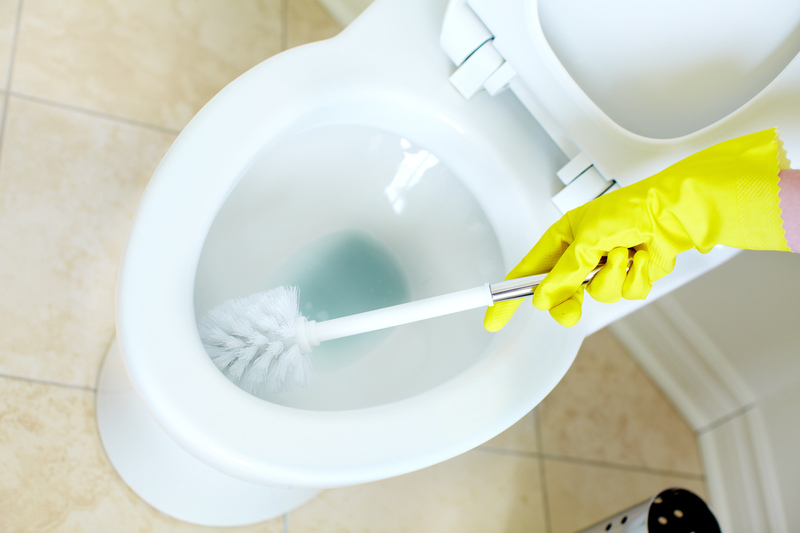Discover the Benefits of a Structured and Attainable Cleaning Plan
Posted on 07/06/2025
Discover the Benefits of a Structured and Attainable Cleaning Plan
Are you overwhelmed by clutter and chaos at home? Striving to maintain a clean and welcoming environment can be challenging amidst a busy schedule. Implementing a structured and attainable cleaning plan can revolutionize your home life, boost your mood, and increase productivity. In this comprehensive guide, we delve deep into the advantages of having a well-organized cleaning schedule, provide actionable advice, and demonstrate why adopting a systematic approach can become a lifelong habit for stress-free living.
What Is a Structured and Attainable Cleaning Plan?
A structured cleaning plan refers to a thoughtfully designed schedule or checklist that guides your cleaning tasks, ensuring every area gets attention. An attainable plan emphasizes practicality, making goals realistic and achievable without disrupting your routine or causing burnout. This approach brings consistency to your cleaning efforts by setting precise, actionable steps and delegating responsibilities if needed.
Key Elements of an Effective Cleaning Plan
- Clear Objectives: Defined targets for each cleaning session.
- Consistency: Adhering to the schedule regularly.
- Flexibility: Adapting to unexpected changes or busy periods.
- Responsibility: Assigning tasks among household members.
- Time-Efficient: Making every cleaning session manageable and purposeful.

Why Establish a Cleaning Plan? The Unexpected Benefits
Committing to a realistic cleaning schedule offers more than a tidy home. It nurtures mental well-being, enhances day-to-day efficiency, and conserves energy for other priorities. Below, we explore the critical advantages of this structured approach:
1. Reduced Stress and Anxiety
Clutter leads to chaos, both physically and mentally. Walking into a disorganized room can instantly spike stress levels. However, sticking to an attainable and structured cleaning plan helps prevent messes from accumulating. This control replaces anxiety with a sense of accomplishment. According to psychologists, a tidy living space can lower cortisol levels, increase calmness, and create a sanctuary where you can truly relax.
2. Enhanced Time Management
A cleaning routine that fits your lifestyle prevents frantic, last-minute scrambles before guests arrive. By scheduling tasks and breaking chores into daily, weekly, or monthly lists, you make efficient use of your time. Consistent upkeep saves hours that would otherwise be spent battling overwhelming messes. Imagine reclaiming your weekends--and unlocking time for what truly matters!
3. Improved Health and Hygiene
A systematic approach to cleaning targets high-touch surfaces and problem areas, minimizing dust, allergens, and germs. This practice curbs the spread of illnesses, particularly in high-traffic or shared spaces. Families with allergies or respiratory concerns often notice significant improvement in their environments. The result? Fewer sick days, better sleep, and overall elevated wellness.
4. Boosted Productivity and Focus
It's easier to concentrate in a tidy environment. Structured cleaning schedules reduce distractions, ensuring that misplaced items and messes no longer steal your attention. Students, professionals, and at-home workers all stand to benefit from organized and distraction-free homes. With everything in its place, you can channel your focus more effectively.
5. Long-Term Savings
Routine maintenance prevents bigger problems and costly repairs. Regular cleaning plans preserve the lifespan of furniture, appliances, carpeting, and finishes by preventing buildup and wear. You'll also spend less on emergency cleaning supplies or professional services, making it a budget-friendly habit in the long run.
Creating Your Personalized Cleaning Routine
Designing an achievable cleaning plan tailored to your household guarantees sustainability. Here's how you can build a routine that fits seamlessly into your daily life:
Step 1: Assess Your Needs
- List every area and room in your home, including overlooked spaces like entryways or basements.
- Identify high-traffic and high-use zones that require frequent attention.
- Consider special conditions: pets, children, seasonal changes, and allergy concerns.
Step 2: Categorize Cleaning Tasks
- Daily: Quick chores like making beds, dishes, wiping counters, and tidying clutter.
- Weekly: Mopping floors, dusting, bathroom deep cleaning, changing linens, garbage removal.
- Monthly: Cleaning window sills, appliances, organizing storage, wiping baseboards.
- Seasonal: Major decluttering, gutter cleaning, yard maintenance, washing windows.
Tip: Use a printable cleaning checklist or a digital calendar to schedule each category.
Step 3: Delegate Responsibilities
- Share chores among family members based on age and ability.
- Assign rotating tasks to avoid monotony and maintain engagement.
- Promote teamwork with mini-rewards or friendly competitions.
Step 4: Set Realistic Goals
- Break big projects into smaller, more manageable steps.
- Allocate specific time slots for cleaning--such as 15 minutes after dinner or a Saturday morning hour.
- Remember: consistency beats intensity. Aim for regular progress, not perfection every time.
A plan that feels attainable is one you're more likely to stick with in the long haul. Forgive occasional slip-ups and simply resume the plan where you left off!
Tips to Make Your Cleaning Plan Habit-Forming
Even the best home cleaning schedules can falter without motivation. Here's how to transform good intentions into a sustainable routine:
- Visual Reminders: Post your cleaning checklist in a visible spot or set phone alerts.
- Pair With Pleasures: Listen to music or podcasts while cleaning for an energy boost.
- Track Progress: Check off completed tasks to build momentum and satisfaction.
- Celebrate Milestones: Treat yourself after completing a week or month of consistent cleaning.
- Adjust as Needed: Revisit your plan monthly to tweak goals or schedules depending on life changes.
Involving the Whole Household
A coordinated cleaning plan fosters responsibility and teamwork, especially in households with multiple members. Teaching children simple chores helps establish lifelong habits of cleanliness. Plus, sharing the workload prevents resentment and burnout.
- Assign Age-Appropriate Tasks: Even young children can help with simple jobs like sorting laundry or picking up toys.
- Create a Rotation Schedule: Keep chores fair and prevent fatigue by rotating responsibilities.
- Hold Family Meetings: Discuss how the plan is working, share successes, and address any challenges.
Technology and Tools to Streamline Your Cleaning Routine
Modern solutions make it easier than ever to stick to an organized cleaning schedule. Here are valuable tools and technologies to help you stay on track:
- Cleaning Apps: Programs like Tody, Clean My House, or OurHome send reminders and track progress.
- Digital Calendars: Use Google Calendar or similar apps to block time for cleaning.
- Smart Home Devices: Robot vacuums, programmable air purifiers, and voice assistants can automate repetitive tasks.
- Color-Coded Tools: Assign specific cloths, sponges, or bins for each room to prevent cross-contamination and speed up cleaning.
When and How to Tweak Your Cleaning Plan
No plan should be rigid. Periodically review and revise your plan to accommodate holidays, family growth, or changes in your routine. As your life evolves, so should your cleaning strategy. Staying flexible ensures continued success and minimizes frustration.
- Reassess schedules before busy seasons or after major life events (like a new baby or pet).
- Shorten sessions during stressful periods; increase frequency before gatherings or celebrations.
- Don't hesitate to outsource a deep-clean if you're falling behind--professional help can recalibrate your progress.
Frequently Asked Questions About Structured and Attainable Cleaning Plans
How do I stay motivated to keep cleaning?
Set small, daily goals, celebrate your achievements, and remind yourself of the positive impact a clean home has on your well-being. Involve other household members to distribute the workload and boost accountability.
What if I have a busy schedule?
Design an attainable home cleaning plan by focusing on quick, high-priority tasks daily and reserving larger chores for weekends or less busy periods. Even 10-15 minutes a day goes a long way!
Should I clean everything myself?
Delegation is key in a sustainable cleaning routine. Share tasks based on ability, and don't hesitate to ask for help or hire professionals when needed--especially for deep-cleaning projects.
Can I maintain a clean home with pets or kids?
Absolutely! Adapt your plan to address pet hair, spills, and extra mess. Involve children in age-appropriate tasks to reduce your load and teach them valuable life skills.

Conclusion: Make Cleaning Manageable--And Life More Enjoyable
Discovering the benefits of a structured and attainable cleaning plan is transformative. It brings peace of mind, enhances daily living, and fosters lasting order in your home. With calculated, realistic steps and continuous adaptation, you'll experience more time, energy, and joy--every single day. Start building your plan today and embrace the satisfaction of a clean and harmonious living space.
Quick Reference Checklist: Your Roadmap to a Cleaner, Happier Home
- Assess your home's unique cleaning needs
- Divide tasks into daily, weekly, and monthly routines
- Assign responsibilities and rotate chores
- Use technology and visual reminders
- Review and adjust your plan regularly
- Celebrate all progress--big or small!
Experience the positive change of a structured and manageable cleaning plan--your home (and mind) will thank you!




